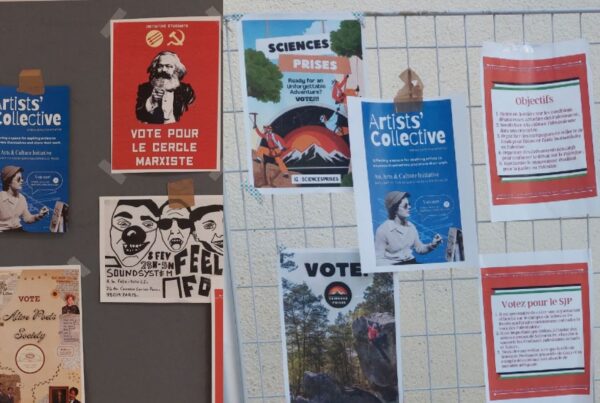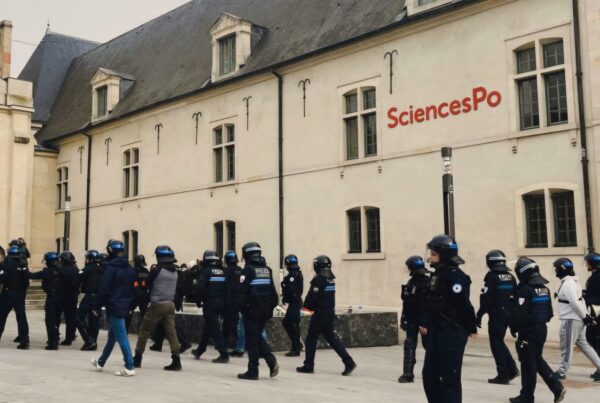Over the past decade, Sciences Po has been going through a gruesome governance crisis marred by scandals, controversies, and public outcry. Will the presidency of Luis Vassy usher in a new era of hope for our institution, or will the curse continue to haunt us?
***
On October 17, 2024, LS01 was filled with Sciencespistes eagerly waiting for newly elected Director Luis Vassy and the rest of the Sciences Po administration to arrive. In those few moments of delay, I thought to myself, perhaps like many others did, that it was as if a collective consciousness existed in that moment of anticipation, a consciousness filled with scepticism, hope, and the lingering weight of the past.
It is difficult to discuss Sciences Po today without mentioning “crisis.” The word has become almost synonymous with our institution and its recent history. If you take a closer look, you’ll see that these crises and setbacks have been accumulating for several years now.
Let’s go back to 2012 and meet the famed Richard Descoings. He was then in the midst of a storm following an investigation launched by the Court of Auditors into the sumptuous bonuses distributed during his tenure. He was found dead of a heart attack in a hotel room in New York, after a night with escort boys. Descoings was succeeded by Frédéric Mion, who was forced to resign in February 2021 for having kept silent and for concealing suspicions of incest against Olivier Duhamel, then president of the Fondation Nationale des Sciences Politiques.
Finally, the infamous Mathias Vicherat, who resigned last year amid a domestic violence incident with his partner, remains in the spotlight. In October, Vicherat and his former partner were tried before the correctional chamber of the Paris Court. The affair was particularly striking. Perhaps it is best reflected in the words of its prosecutor who called it “a case where the victims are also the culprits.” The court dealt out a five month suspended prison sentence to Vicherat, and an eight month suspended sentence to his former partner. .
After consecutive torment and the interim leadership of Jean Bassères, in September lastyear the board of the Fondation Nationale des Sciences Politiques cast their vote for a new director. which appointed Luis Vassy as the next Director of Sciences Po. Interestingly, Luis Vassy was a classmate of both Mathias Vicherat and President Macron at the École Nationale d’administration (ENA).
Luis Vassy’s background is compelling: the son of Latin American political refugees, he grew up in the suburbs of Paris before attending Sciences Po, ENS Cachan, and ENA. He became a diplomat at just 24, quickly rising through the ranks to serve in prominent roles. These included his time as the Ambassador of France to the Netherlands and being the Permanent Representative to the Organisation for the Prohibition of Chemical Weapons. Most recently, he was the Chief of Staff to the Ministers for Europe and Foreign Affairs Catherine Colonna and Stéphane Séjourné. But, will this extensive experience in international relations and civil service provide the foundation needed to lead and, more importantly, reinvent Science Po? Only time will tell.
Fast forward to a few months ago, and we find ourselves back where I started: the open dialogue with President Vassy was underway at the Reims campus. What followed over the next two hours was a dynamic exchange filled with passionate questions and pragmatic insights.
Luis Vassy’s tone was conciliatory yet resolute. He began by outlining his vision for Sciences Po, emphasising the importance of academic freedom, institutional excellence, and international openness and diversity as the core pillars of his tenure. “Excellence is a process,” Vassy remarked, reflecting on Sciences Po’s pursuit and vision to be a place that nurtures potential, supports critical thinking, and stands as a beacon of freedom in academic and societal contexts.
Reflecting on his previous experience in managing diplomatic communications, Vassy discussed the importance of embracing digital innovation in education. He highlighted the necessity of updating our institution’s digital infrastructure, including its online learning platforms and administrative services, to better serve students and faculty alike. Vassy also shared his plans for adapting Sciences Po’s curriculum to address the rapidly changing global landscape, with a particular focus on integrating sustainability, artificial intelligence, and ethical governance into academic programs.
In response to questions about the university’s commitment to diversity and inclusion, Vassy reaffirmed that these principles remain at the heart of Sciences Po’s mission. “We must strive to create an environment where every student feels represented and supported,” he said, noting that he plans to work closely with the Diversity and Inclusion Office to accomplish this.
The session took a more intense turn when students raised concerns about the university’s response to the conflict in Gaza and its ties with Israeli universities. One of the most pressing questions was on Sciences Po’s stance, especially in light of recent actions taken by other universities to divest from or suspend relationships with institutions complicit in human rights violations.
In response, Vassy clarified, “Sciences Po does not engage in financial investments that could be subject to divestment, as the institution does not hold an endowment.” He defended the continuation of academic partnerships in politically sensitive contexts, arguing that severing educational ties undermines the very principles of academic freedom. Furthermore, he drew comparisons with past geopolitical situations, such as the U.S. invasion of Iraq, to illustrate his belief that academia should be the “last bridge” to be severed in international relations.
The students, as anticipated, challenged the university’s response to protests related to the Gaza conflict. Many expressed concerns about what they perceived as the suppression of pro-Palestinian voices on campus, citing specific cases where disciplinary measures were taken against student activists.
Vassy reiterated his support for the freedom of expression but stressed the importance of upholding university policies and respecting the rights of all members of the community. He acknowledged that Sciences Po had taken disciplinary measures in certain cases, particularly when protests disrupted university operations or violated campus policies. He framed the disciplinary measures as essential for maintaining an environment conducive to learning and respectful dialogue. In the same breath, he emphasised that the university remains open to criticism and committed to addressing concerns through appropriate channels.
Reflecting on his own experiences as the child of political refugees, Vassy spoke passionately about the role of education in shaping future leaders who are not only academically proficient but also socially conscious and globally aware. “We must ensure that our students are not only well-versed in theoretical knowledge but [that they are] also equipped with the practical skills and critical thinking needed to navigate the complexities of the modern world,” he remarked.
Luis Vassy also made it clear that fostering a strong connection between the student body and the administration is a key priority for his tenure. He acknowledged that previous challenges in communication have led to misunderstandings and frustrations. He thus pledged to implement more “transparent and accessible channels” for student feedback.
Finally, Luis Vassy reflected on the broader responsibilities of Sciences Po as an institution with a social mission. He expressed his commitment to addressing the university’s long standing issues while building on its strengths. In his closing remarks, Vassy depicted an institution at a pivotal moment, poised for renewal and transformation under his leadership.
As I left LS01 that day, I couldn’t help but wonder: Will this presidency truly mark the beginning of a new chapter for Sciences Po? Or are we merely witnessing the latest episode in a long saga of crises? The dialogue was a promising first step, but it remains to be seen whether it will translate into meaningful action. In the words of Luis Vassy, ”The return to serenity is the priority.” As such, the upcoming months will be integral as we witness how our new director navigates this critical juncture in the history of Sciences Po.
Other posts that may interest you:
Discover more from The Sundial Press
Subscribe to get the latest posts sent to your email.





